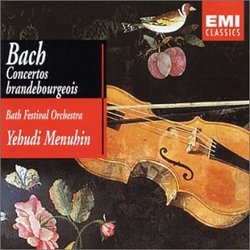| All Artists: Bach, Bath Festival Orchestra, Menuhin Title: Bach J.S: Brandenburg Concertos Members Wishing: 0 Total Copies: 0 Label: EMI Classics France Original Release Date: 1/1/2002 Re-Release Date: 11/11/2002 Album Type: Import Genre: Classical Style: Symphonies Number of Discs: 2 SwapaCD Credits: 2 UPC: 724357540124 |
Search - Bach, Bath Festival Orchestra, Menuhin :: Bach J.S: Brandenburg Concertos
 | Bach, Bath Festival Orchestra, Menuhin Bach J.S: Brandenburg Concertos Genre: Classical
|
Larger Image |
CD Details |
CD ReviewsBACH FROM BATH DAVID BRYSON | Glossop Derbyshire England | 03/13/2004 (5 out of 5 stars) "These 1959 performances well deserve to survive into the cd era. They were among my earliest acquisitions in a lifetime of record collecting, and I am not sure that to this day I have heard a more sympathetic or beautiful set of renderings. The Brandenburgs are all in major keys, and they show us Bach at his most serene and least formidable. Menuhin and his Bath Festival group do not use exactly `period' instruments as we would understand the term these days, but the continuo, including the big keyboard solo part in # 5, is naturally done on the harpsichord, there are recorders not transverse flutes in # 4, and Menuhin uses a `kit' or `piccolo' violin, tuned a third higher than the normal instrument, in #1. Menuhin also takes the first viola part in # 6, which is for the lower strings only, and if I think I have one favourite movement out of the whole set it would be the first movement of # 6 as done here. For once it is not taken too fast, and the sublime march of its polyphony combined with the lovely instrumental tone have saved me from being tempted to think, as surprisingly many seem to, that this concerto is in any way weaker than the others.The other high spot for me is Malcolm's harpsichord solo in # 5, particularly the first movement, and more particularly the cadenza. Malcolm's style is not to everyone's taste, but I simply can't get enough of him. The sticking-point for those who are less enthusiastic tends to be his frequent and rapid changes of registration, felt in some quarters to be meretricious. He is at it here as usual, but the well-judged balance of his instrument against the rest of the group and his superb rhythmic flexibility and subtlety, to say nothing of his imperious technique, should have something to say to everyone whatever they may feel about his registration. I mention these instances as personal favourites. The quality of everything and everybody here is consistently high. Tempi for me are unexceptionable throughout, and while the recorded quality is a little reticent by today's standards it is very clear and faithful. The problem posed by the missing middle movement of # 3 is solved here by taking an arrangement by Britten of the slow movement from one of Bach's trio sonatas, and it is as good a solution as I am familiar with."
|

 Track Listings (13) - Disc #1
Track Listings (13) - Disc #1